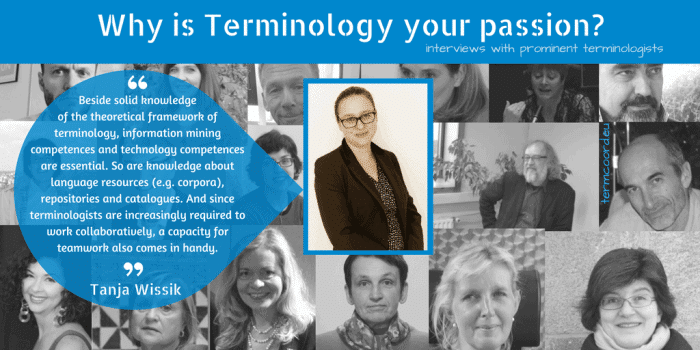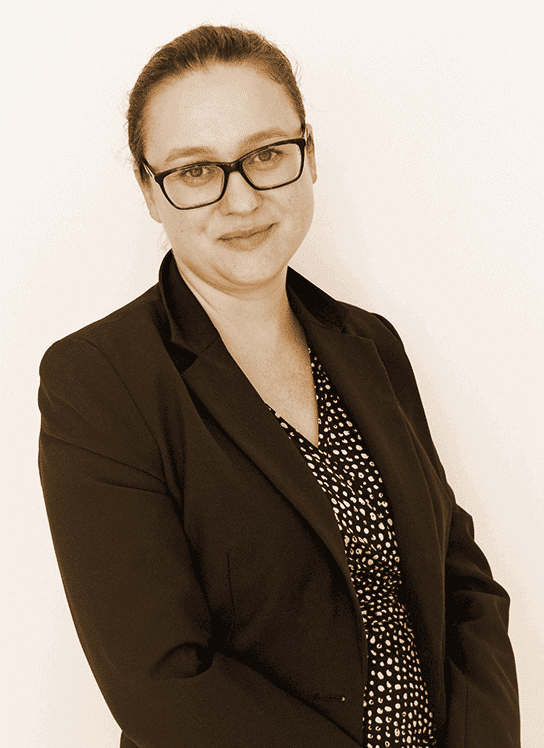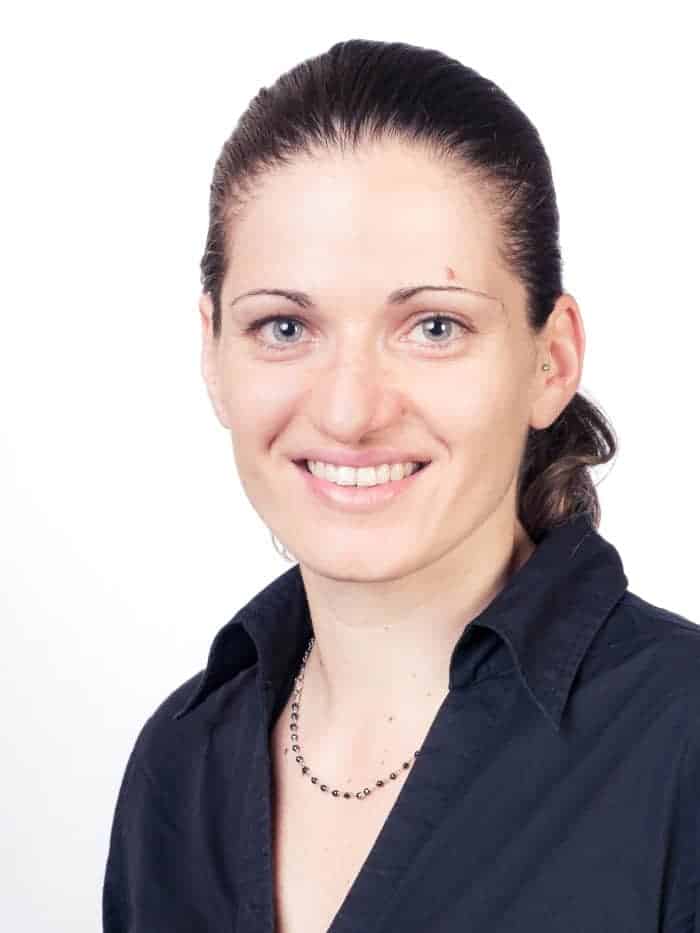Tanja Wissik graduated from the University of Graz in translation and interpretation studies. She holds a PhD from the University of Vienna in translation studies with a specialization in the field of terminology and corpus linguistics. She has been working in numerous national and international research projects first as a junior researcher at the Institute for Specialized Communication and Multilingualism of the European Academy Bolzano, and then as a researcher and lecturer at the University of Vienna. Currently, she works as a senior researcher at the Austrian Centre for Digital Humanities of the Austrian Academy of Sciences and teaches information technologies for translators at the University of Graz. Her research interests include digital language resources and technologies, especially terminological resources and corpora, metadata, workflow research, variational linguistics, translation studies, and the teaching of DH technologies and methods.

1. When and why did you develop an interest in terminology?
I developed an interest in terminology during my studies, when I was getting my degree in translation and interpretation at University of Graz (Austria), more precisely during the legal translation course. Later I delved deeper into the theoretical framework when I was writing my master thesis.
2. You have participated in numerous national and international research projects at the Institute for Specialised Communication and Multilingualism of the European Academy Bolzano and at the University of Vienna. Can you tell us briefly about a terminology-related research project?
I have worked in several projects and it is hard to pick one. However, here I want to highlight the LISE (Legal Language Interoperability Services) project, a European Project that ran from 2011 to 2013 and was coordinated by the University of Vienna. The project addressed the urgent need for consolidated administrative nomenclatures and legal terminologies as tools to enhance interoperability and cross border collaboration. One aspect of the project was the analysis of terminology workflows in different terminology centres throughout Europe and beyond in order to identify current problems and to propose solutions for optimization. The result of this study was a best practice guide “Guidelines for collaborative legal/administrative terminology work” that can be useful for any terminologist working with terminology in the legal and administrative domain.
3. In your PhD thesis from the University of Vienna, Terminologische Variation in der Rechts- und Verwaltungssprache (2012), you focused on terminological variations from the perspective of German as a pluricentric language. Can you tell us about the most salient findings of your research?
The purpose of my PhD study was to analyse whether the legal and administrative language of higher education shows variation depending on geopolitical factors (e.g. legal system) and whether the variety-specific and simultaneously LSP-specific terminological units have been documented in (specialized) dictionaries, terminological databases or other reference works. One of the results was that there are some variants that are codified and others that are not. Especially abbreviated forms and their variations are absent from dictionaries, terminological databases etc. Since abbreviations are not immediately transparent, it would be advisable to include abbreviated forms and their variants more systematically in relevant reference works in the future, in order to facilitate the work of translators.
4. Among other subjects, your research activity focuses on legal terminology. What are, in your opinion, the main challenges of working with legal terminology?
The main challenges are:
- that legal terms are subject to national and administrative boundaries;
- that most of the time we are only dealing with functional equivalents;
- that the legal terms and their definitions are constantly changing due to the introduction of new laws and regulations and the abrogation of others;
- the collaboration between the language and the legal expert.
5. You have taught translation and translation-related technologies at the University of Vienna and at the University of Graz. Can you tell us what part terminology plays in your teaching programs?
Since I am teaching these technologies at BA level, the curriculum foresees that I give an overview of translation technologies (in the broader sense). Terminology Management Systems, Terminology Extraction Systems and Quality Assurance tools are a part of it, but also translation memory systems and corpus query tools, as well as searching language resources in general through repositories, catalogues and other entry points. A focus also lies in information mining competence.
In the MA programme, there are special courses dedicated solely to terminology theory and practice as well as hands on parts with the specific tools.
 6. How do you think terminology has developed in Austria, the country of Eugen Wüster – the father of terminology? How do you visualise its future?
6. How do you think terminology has developed in Austria, the country of Eugen Wüster – the father of terminology? How do you visualise its future?
We are proud of the achievements of Eugen Wüster. Not only is there a Wüster Archive here in Vienna, there is also a prize named in his honour. The Eugen Wüster Price is awarded every three years for outstanding achievements in terminology research and related fields.
Looking to the future, I hope that research in terminology studies will be optimally supported by research infrastructures in order to continue to do theoretical and empirical research driven by questions coming from industry, public institutions, as well as scientific institutions.
7. You are currently working as a senior researcher at the Centre of Digital Humanities of the Austrian Academy of Sciences. Can you tell us about new trends in terminology research?
One important trend, not only in terminology research but in general, is the collaborative aspect and the sharing and reusing of resources. Research Infrastructures such as CLARIN, a European Research Infrastructure for Language Resources and Technology, enable these collaborations.
CLARIN offers, for example, long-term archiving in sustainable repositories. The deposited resource can be cited sustainably with a persistent identifier and other users can easily find language resources with the help of metadata. Furthermore, the users can analyse and enrich the resources integrated into the repository with tools provided by the infrastructure.
8. In which sectors do you see the main job opportunities for a professional terminologist in Austria?
There are mainly two possibilities: the private sector and the public sector. Furthermore, there is the possibility to teach at university level, since terminology is an integral part of all study programs in translation studies in Austria (University of Graz, University of Innsbruck and University of Vienna) as well as at the University of Applied Science Upper Austria within the study program for technical communication.
9. What advice would you give to young professionals who aspire to start a career as a terminologist? What training would you recommend?
It is important to do internships, maybe even before finishing your studies. Likewise, the aspect of networking is important. Platforms like LindedIn or Xing can help with that.
As for training outside the university curriculum, I would suggest summer schools like the International Terminology Summer School that takes place in Cologne and Vienna on a rotating basis.
10. What would you define as the most important competences of the 21th century terminologist?
Beside solid knowledge of the theoretical framework of terminology, information mining competences and technology competences are essential. So are knowledge about language resources (e.g. corpora), repositories and catalogues. And since terminologists are increasingly required to work collaboratively, a capacity for teamwork also comes in handy.
 Interviewed by Iris Rinner – Terminology trainee at the Terminology Coordination Unit of the European Parliament.
Interviewed by Iris Rinner – Terminology trainee at the Terminology Coordination Unit of the European Parliament.
Iris was born and raised in the multilingual region of South Tirol, Italy. She graduated with Bachelor of Arts in Modern Foreign Languages and Cultures from the University of Sassari. The next step in Iris ‘academic pursuits was Vienna, where she was awarded Master of Arts in Specialized Translation from the University of Vienna. Iris did her Erasmus Exchange Semester at the University of KU Leuven in Antwerp, where she followed the program of the Postgraduate European Master in Specialized Translations. Subsequently, Iris got an Erasmus Internship at the same university, which she completed successfully.
